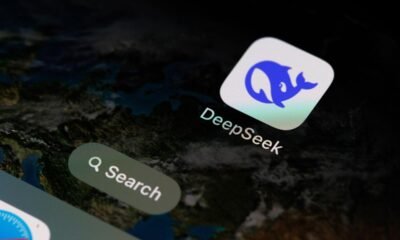Tools & Platforms
Dan Ives slams Apple’s tech showcase as ‘an episode out of ‘Back to the Future” and turns up the heat on Tim Cook over ‘elephant in the room’

Apple’s annual Worldwide Developers Conference (WWDC) in June left some of Wall Street’s most prominent voices feeling oddly nostalgic—and not in a good way. According to Dan Ives, a top tech analyst at Wedbush Securities known for his prescient, albeit oft-times bullish, calls on Silicon Valley’s giants, was bearish about Apple. The atmosphere at this year’s WWDC, he wrote in a July 30 research note, “felt like an episode out of ‘Back to the Future’”—especially when it came to Apple’s treatment of artificial intelligence.
While fellow tech titans are racing to put AI front and center, Apple’s WWDC presentation was notable for its near silence on the subject. “Barely no mention of AI,” Ives remarked in his latest report, calling it “the elephant in the room.” He noted this was a stark contrast to the fever pitch seen at rival developer events. Analysts, investors, and developers tuned in with expectations of a grand reveal that would clarify Apple’s ambitions for the “AI Revolution.” Instead, they watched as the company leaned on traditional strengths—hardware updates and a strong services story—leaving the future of Siri and Apple’s broader AI roadmap conspicuously vague.
This omission has become a growing concern for analysts like Ives, who believe Apple is at a crossroads. “It’s becoming crystal clear that any innovation around AI at Apple is not coming from inside the walls of Apple Park,” he wrote, referencing the company’s famed Cupertino headquarters. While Apple has historically prided itself on building transformative technology in-house, Ives argues those days may be over.
Time for an acquisition?
“The time has come” for a big acquisition, he wrote, singling out Perplexity as a “no brainer” acquisition target—even if it costs upwards of $40 billion. According to Ives, such a move could instantly supercharge Apple’s lagging AI platform and help reposition Siri as the “next AI gateway for consumers.”
To date, Apple’s biggest acquisition remains Beats, a $3 billion deal in 2014—an order of magnitude smaller than the types of deals transforming the AI sector today. Apple’s traditionally cautious approach to M&A, Ives suggests, may be holding it back at a time when speed is everything. “AI technology on the enterprise and consumer landscape is happening at such a rapid pace Apple will not be able to catch up with an internally built solution,” he warned. The stakes, Ives estimates, are high: A successful AI monetization strategy could add as much as $75 per share to Apple’s valuation. “We believe [CEO Tim] Cook needs to rip the band-aid off and finally do an M&A deal,” he wrote.
The muted AI narrative at WWDC comes during a broader period of transition for Apple. While demand for iPhones—a bellwether for the company—remains globally robust, with particular improvement in China after a year of tough competition, the company faces mounting headwinds. Trade tensions, evolving supply chain risks, and increasing pressure from lower-priced rivals in Asia have stressed Apple’s core markets.
For now, analysts are keeping faith with Apple’s near-term performance. Wedbush maintains its “Outperform” rating, with a 12-month price target of $270 per share, citing expected growth driven by the upcoming iPhone 17 and continued strength in services. The stock was trading at $211.27 at the time of writing. But Ives is steadfast: the next chapter—centered on AI—will define Apple’s future.
Cook’s extraordinary record—and mounting criticism
To be clear, Cook has had a legendary run after succeeding Steve Jobs in 2011. Over the ensuing 14 years, Cook has led Apple through a period of extraordinary shareholder value creation—transforming a $300 billion company into a $3.2 trillion titan. Under his stewardship, Apple refined its operational efficiency, reinvigorated its services division, and delivered massive profits through established hits like the iPhone, AirPods, and Apple Watch. But as Fortune‘s Geoff Colvin reported, “suddenly his weaknesses are on display in the AI era.”
A chorus of analysts has joined Ives in arguing that Cook’s operational excellence and supply-chain mastery may not be enough to win the future, as the AI era upends the tech industry’s priorities. The first half of 2025, furthermore, has been bruising. The company’s stock is down about 16%, while rivals like Microsoft and Alphabet have soared on aggressive bets in generative AI. Apple’s “Apple Intelligence” initiative, which was supposed to position Siri and other features at the forefront of consumer AI, has failed to capture investor or developer enthusiasm. Meanwhile, key AI executives have left: Apple’s top AI executive Ruoming Pang recently defected to Meta, just weeks after another top Apple AI scientist, Tom Gunter, resigned. Simultaneously, Chief Operating Officer Jeff Williams—a long-touted Cook successor—is set to retire, forcing a broader management overhaul.
These departures have intensified debate about Apple’s innovation pipeline. Critics argue that under Cook, Apple has not delivered any genuinely transformative new product since the Jobs era, with most recent hits—like AirPods or the Apple Watch—refining rather than redefining product categories. The risk, analysts warn, is existential: If smart devices shift into new AI-centric paradigms and Apple fails to respond forcefully, the company’s platform risks obsolescence.
Research firm LightShed Partners rocked investors and the tech press in July by calling for a regime change. Analysts Walter Piecyk and Joe Galone insisted Apple needs a product-focused CEO, not one centered on logistics. They warned Apple’s lack of compelling innovation in AI and the relatively stagnant progression of Siri could irreversibly erode its competitive edge as Google, Microsoft, and OpenAI press forward.
Cook’s defenders argue Apple has a unique position: its platform lock-in gives it time to execute a measured AI response. And historically the company has rarely been first-mover—its success derives from perfecting existing technologies, not inventing them. Nevertheless, with AI’s foundational impact compared to the internet or electricity, allowing the competition to set the pace could be dangerous.
Ives is still backing Cook, with reservations. “Patience is wearing thin among investors and importantly developers,” he warned. The coming months, particularly as Apple’s product cycle heats up in September and beyond, may prove pivotal—not just for the company’s balance sheet. Ives said Wedbush believes Cook will be Apple CEO for another five years, at least, but there are mounting challenges, from the “tariff iPhone quagmire,” with Apple’s manufacturing operations in China directly exposed to trade uncertainty, to President Donald Trump’s displeasure with India as an alternate supply chain solution, to “missing the AI foundational strategy.” He concluded, “this chapter will define Cook’s legacy.”
“It’s time for Cook and Cupertino to face the new reality of this quickly morphing AI-driven tech landscape,” Ives wrote. “Because if they do not change, it will be a historic strategic black eye for Apple in our view.”
For this story, Fortune used generative AI to help with an initial draft. An editor verified the accuracy of the information before publishing.
Tools & Platforms
San Jose, Calif., to pilot AI tool to speed up build permitting

San Jose, California, in the heart of Silicon Valley, is testing new artificial intelligence software designed to speed up the city’s building permit process, with the goal of making it easier to build residential housing.
The pilot program, launched Thursday by the city’s Planning, Building and Code Enforcement Department, uses AI from CivCheck to pre-check applications and flag problems before they’re submitted. According to the department’s Housing Production Dashboard, more than 90% of accessory dwelling unit applications are returned to applicants due to missing information, which can delay construction. The city aims to build 62,200 units by 2031.
The pilot is part of San Jose’s larger push to use technology across government, from optimizing bus routes to installing license plate readers.
Tasha Dean, chief communications officer for Mayor Matt Mahan, called the effort a step toward “bringing government into the 21st century.”
“I think that most residents interact with their government in a few ways, right? They wait in line at the DMV, they come to their city council meeting and sit through hours of back and forth with elected officials, or they apply for and they spend weeks going back and forth with planners. These are all things that are incredibly frustrating — they’re slow, and ultimately, they reduce trust in government,” Dean said in an interview, “We’re trying to change that view [and] prove that government can be responsive to the needs of the people.”
The testing phase for building permits will begin this fall, with staff using the tool alongside manual reviews. If the pilot project proves successful, Dean said, the city will release it to the public as early as next year, first for accessory dwelling unit permits, which account for roughly a quarter of new-build permit applications, and eventually for single-family homes.
“I mean, part of the big delays and the issues that makes the housing crisis so bad in California is how long it takes,” she said. “And if we can reduce the friction there, ultimately we hope that we can get more shovels in the ground.”
Dean said the AI system could also help the city move quickly in emergencies, similar to the tool California Gov. Gavin Newsom announced last May, designed to expedite the building permit approval process in Los Angeles after the devastating Eaton and Palisades wildfires in January, which destroyed more than 16,000 homes, businesses and other buildings.
Tools & Platforms
CFOs must hone data interpretation skills in AI age, AuditBoard CEO says

Balancing growth against risk is nothing new to finance chiefs, but as CFOs look to navigate continuing economic uncertainty, alongside regulatory change, it’s a costly challenge that’s only grown more complex. The size of the governance, risk and compliance solutions market jumped over 14% to reach a valuation of $51.5 billion as of early 2025, as companies seek to hedge against regulatory and economic shifts as well as technology changes and risks, according to an April article by Securify.
In this environment, many finance chiefs are also being asked to cut down on costs amid ongoing pricing pressures, while at the same time, to find the space and resources needed to integrate emerging technologies such as artificial intelligence into their businesses.
That puts many finance chiefs in a bind: while “every CFO wants to leverage the savings associated with enhanced productivity through AI,” they also have to account for the risks that come alongside the technology — which are “enormous,” Raul Villar Jr., CEO of audit and compliance platform AuditBoard told CFO Dive.
Such risks include everything from false positives or “hallucinations” generated by AI tools, to fraud and cyberattacks utilizing the technology to unsafe practices by employees using the technology. As such, the “number one component of risk that CFOs are looking at today” surrounds where AI sits inside of their organization, Villar Jr. said in an interview.
Unraveling the AI risk tangle
Business and technology leaders have continued to shine a spotlight on AI’s potential, with many looking to tap the technology to help solve some of the challenges faced by continued economic headwinds. AI spending, especially on solutions like “agentic AI” tools that can perform tasks with little or no human supervision, has continued to jump in recent months, with a growing number of companies investing $10 million or more in the tool, CFO Dive previously reported.
In the face of all that attention, there’s “so much pressure for every CFO to be leveraging AI,” Villar Jr. said. If you’re a CFO at a public company, “it comes up on every public call. If you’re [in] a private company, your board is definitely asking you. It’s top of mind,” he said.
Villar Jr. has served as CEO for the Los Angeles, California-based AuditBoard — which offers audit and compliance software — since July of this year, according to his LinkedIn profile. Prior to the platform, he served as executive chair for business management software provider Simpro. Past roles also include a 21-year span at human resource software company APD, where he held a number of positions including serving as its SVP, sales, major account services.
As finance chiefs mull the potential return on investment of AI, however, the risks — and potential costs —associated with the technology are looming large in their minds as they seek to navigate a host of economic and regulatory challenges, including potential shifts to how AI itself is regulated.
That means CFOs have to strategically “pick their spots” when it comes to investing and integrating AI tools into their organizations, Villar Jr. said. To do so effectively, they don’t need to just understand AI capabilities and their associated risks, but the data that is being fed into the technology and the risks associated with those data sources, he said.
Keeping the focus on data
As AI becomes more commonplace inside of businesses, CFOs will face a twofold challenge: they will need to ensure the security of the data being fed into emerging AI tools, while also being able to quickly parse the insights they need from that data, he said.
“Protecting your data is critical, but turning data into insights is probably the most important thing a CFO has to learn to do because we’ve all gotten accustomed to a certain data layer…that [companies] report on,” he said.
As the technology matures, CFOs should approach their AI investment decisions similarly to how they approach headcount decisions: “It’s just another lever to pull from a productivity perspective, but each function is different and you’re going to have to pick winners and losers within your firm and test and manage quickly,” Villar Jr. said.
Tools & Platforms
Trotter Overhead Door Becomes First Oklahoma Company to Implement AI-Powered Diagnostic Technology for Precision Garage Door Opener Installation Services

Company vehicle and branding from Trotter Overhead Door Garage + Home, representing their trusted garage and home solutions.
Trotter Overhead Door Garage + Home, serving Oklahoma City since 1983, is the first in the state to use AI diagnostic technology for garage doors. The new system ensures precise, reliable opener installations by analyzing door specs, weight, and usage patterns.
Richardson, TX – Trotter Overhead Door Garage + Home has announced the implementation of groundbreaking artificial intelligence diagnostic technology, positioning the company as Oklahoma’s first garage door service provider to integrate AI-powered precision systems into daily operations. This technological advancement represents a significant milestone for the family-owned business that has served the Oklahoma City metropolitan area since 1983.
The innovative AI system analyzes door specifications, weight distribution, and operational patterns to ensure optimal performance and longevity. This technology particularly benefits garage door opener installation projects by providing precise compatibility assessments and optimal configuration settings. This development comes as property owners increasingly seek reliable solutions for garage door repair services that minimize future maintenance requirements.
Revolutionary Technology Transforms Service Delivery
The new AI diagnostic platform utilizes advanced sensors and machine learning algorithms to evaluate garage door systems before service begins. This technology provides detailed assessments of mechanical components, electrical systems, and structural integrity, allowing technicians to identify potential issues before they become costly problems.
Property owners throughout the Oklahoma City area can now benefit from enhanced accuracy in service recommendations and installation procedures. The system’s diagnostic capabilities extend beyond standard visual inspections, offering comprehensive analysis that improves both safety and performance outcomes for overhead door installations in OKC.
Enhanced Safety Protocols Through Smart Technology
Safety remains paramount in all garage door operations, and the AI system introduces multiple layers of protection for both technicians and property owners. The technology continuously monitors installation processes, alerting technicians to potential safety hazards or installation irregularities in real-time.
The diagnostic system evaluates spring tension, cable integrity, and opener compatibility to prevent accidents and equipment failures. This proactive approach has already shown promising results in reducing service callbacks and improving customer satisfaction rates across garage door repair projects in OKC.
Family-Owned Innovation Meets Modern Technology
Despite embracing modern technology, Trotter Overhead Door Garage + Home maintains its commitment to family values and personalized service. Jesse and Tina Trotter established the company with a vision of combining superior products with exceptional customer care, principles that continue to guide operations today.
The integration of AI technology enhances rather than replaces the human expertise that has made the company successful. Skilled technicians now have access to precise diagnostic information that enhances their ability to recommend appropriate solutions for each unique situation requiring overhead door services in Oklahoma City.
Comprehensive Service Platform Expansion
The AI diagnostic system supports the company’s full range of services, from routine maintenance to complex installations. Property owners can schedule comprehensive evaluations that provide detailed reports on the health of their garage door system, including recommended improvements and preventive maintenance schedules.
This technology particularly benefits commercial properties that require reliable access and security. The system’s ability to predict maintenance needs helps business owners avoid unexpected downtime and costly emergency repairs, making it a valuable tool for planning garage door repair in OKC.
Training and Certification Programs Launch
To support the new technology implementation, Trotter Overhead Door Garage + Home has developed comprehensive training programs for all service technicians. These programs ensure consistent application of AI diagnostic procedures across all service calls and installations.
The training curriculum includes both the technical operation of the diagnostic equipment and the interpretation of data analytics. This investment in staff development reinforces the company’s commitment to maintaining service quality standards while adapting to technological innovations in overhead door solutions.
Future Impact on the Oklahoma Garage Door Industry
The implementation of AI diagnostic technology positions Trotter Overhead Door Garage + Home at the forefront of industry innovation in Oklahoma. This advancement demonstrates how family-owned businesses can successfully integrate modern technology while preserving traditional values of quality and service.
The company’s 15,000-square-foot facility at 14000 North Santa Fe Avenue in Edmond now serves as a technology hub for garage door services throughout the region. Property owners can visit the showroom to experience the diagnostic technology firsthand and learn about available service options.
Industry analysts expect this technological advancement to influence service standards throughout the Oklahoma garage door market, potentially inspiring similar innovations among other service providers.
About Trotter Overhead Door Garage + Home
Established in 1983 by Jesse and Tina Trotter, Trotter Overhead Door Garage + Home has provided garage door solutions to the Oklahoma City metropolitan area for over four decades. The family-owned company operates from a 15,000-square-foot facility in Edmond, offering installation, repair, and maintenance services for both residential and commercial properties. The company maintains core values of integrity, quality, service, continuous learning, care, and excellence in all operations.
For more information about AI diagnostic services or to schedule a consultation, please get in touch with Trotter Overhead Door Garage + Home at (405) 341-9601 or visit our showroom located at 14000 North Santa Fe Avenue, Edmond, Oklahoma.
Media Contact
Company Name: Trotter Overhead Door Garage + Home
Contact Person: Nate
Email: Send Email
Phone: (405) 341-9601
Address:14000 North Santa Fe Ave.
City: Edmond
State: Oklahoma 73013
Country: United States
Website: https://www.trotteroverheaddoor.com/
-

 Business6 days ago
Business6 days agoThe Guardian view on Trump and the Fed: independence is no substitute for accountability | Editorial
-
Tools & Platforms3 weeks ago
Building Trust in Military AI Starts with Opening the Black Box – War on the Rocks
-

 Ethics & Policy1 month ago
Ethics & Policy1 month agoSDAIA Supports Saudi Arabia’s Leadership in Shaping Global AI Ethics, Policy, and Research – وكالة الأنباء السعودية
-

 Events & Conferences4 months ago
Events & Conferences4 months agoJourney to 1000 models: Scaling Instagram’s recommendation system
-

 Jobs & Careers2 months ago
Jobs & Careers2 months agoMumbai-based Perplexity Alternative Has 60k+ Users Without Funding
-

 Education2 months ago
Education2 months agoVEX Robotics launches AI-powered classroom robotics system
-

 Funding & Business2 months ago
Funding & Business2 months agoKayak and Expedia race to build AI travel agents that turn social posts into itineraries
-

 Podcasts & Talks2 months ago
Podcasts & Talks2 months agoHappy 4th of July! 🎆 Made with Veo 3 in Gemini
-

 Podcasts & Talks2 months ago
Podcasts & Talks2 months agoOpenAI 🤝 @teamganassi
-

 Education2 months ago
Education2 months agoMacron says UK and France have duty to tackle illegal migration ‘with humanity, solidarity and firmness’ – UK politics live | Politics



















